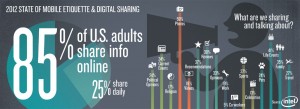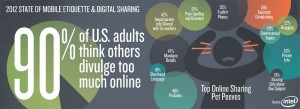Digital Over-Sharing: Main Mobile Etiquette Faux Pas
According to a recent survey sponsored by Intel Corporation and conducted by Ipsos Observer on “Mobile Etiquette” and “Digital Sharing,” 9 out of 10 American adults believe that people are sharing too much information about themselves online, with nearly half of U.S. adults reporting that they feel overwhelmed by the amount of information shared.
Intel’s 2012 “Mobile Etiquette” survey evaluated the current state of mobile manners (compared to previous surveys commissioned by Intel in 2009 and 2011). The survey also examined how U.S. adults share and consume information online and how certain digital sharing behaviors impact culture and relationships.
[ Also Read 5 Social Media Manners to Insult Others ]According to Intel, a 2012 report from the Pew Research Center1 reports that 77 percent of U.S. adults own a laptop or desktop computer, 44 percent own a smartphone and 18 percent own a tablet, with 1 in 10 U.S. adults owning all 3 mobile devices.
In addition to owning mobile devices, U.S. adults are spending an increasingly significant amount of time online. Nielsen recently reported that 117.6 million people visited the Internet via a mobile device last year. As the availability of mobile devices (smartphones, tablets, netbooks, laptops, Ultrabook systems) increases, a continued awareness of how people use their devices is also on the rise, says Intel.
[ Also Read: Can a Mobile Device Double as Phone and TV? ]One-third of U.S. adults (33 percent) responding to the Intel “Mobile Etiquette” survey said they are more comfortable sharing information online than in person. If it wasn’t for the ability to share and consume information online via mobile devices, nearly half of U.S. adults (46 percent) feel they would not know what is happening with their family and friends.
Click the graphic to enlarge it.
“Some people are still figuring out the right balance between staying connected and ‘over-sharing,’” said Intel Fellow Dr. Genevieve Bell, director of user interaction and experience at Intel Labs.
Intel survey respondents stated that they wish people thought more about how others perceive them when reading shared information online, and how this can cause people to form opinions based on a person’s online personality and sharing behavior. Four out of 10 U.S. adults reported that they typically choose not to associate with people whose opinions they disagree with online.
[ Also Read: Are Tablets Really Selling Like Hot Cakes? ]More than one-quarter of respondents (27 percent) stated that they are an open book — both in person and online — and that there is very little they would not share online. However, only about half of U.S. adults (51 percent) said that they would feel comfortable if all of their online activity was made public.
Perhaps this is because 27 percent of U.S. adults admit to having a different personality online than in person, and 1 in 5 U.S. adults (19 percent) reported that they have shared false information online.
Click the graphic to enlarge it.
Most U.S. adults (81 percent) believe that mobile manners are becoming worse (compared to 75 percent of U.S. adults surveyed a year ago), and 92 percent of U.S. adults wish people practiced better mobile etiquette in public.
As a follow up to Intel’s “Mobile Etiquette” surveys in 2009 and 2011, U.S. adults continue to report that the top 3 pet peeves are texting or typing while driving a car (77 percent), talking on a device loudly in a public place (64 percent), and having the volume too loud in a public place (55 percent).
The survey was conducted online within the United States by Ipsos Observer on behalf of Intel from March 1-16, 2012 among a nationally representative sample of 2,008 U.S. adults ages 18 and older. The findings were released Wednesday, May 9.














